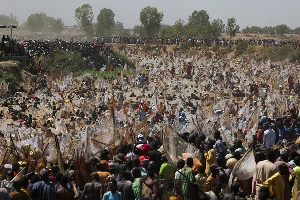With the President finally stating publicly that he is “upset” over the rapidly depreciating cedi, and the implications for the economy, perhaps it’s time for him to call a national economic forum to seek ideas on how best to rescue the situation before it gets worse.
By now, it should be clear to any Ghanaian that no single government (or president) has all the solutions to Ghana’s seemingly intractable economic problems, and that if we can't have coalition governments – the ideal form of governance for a developing country like Ghana that would harness the best ideas from all political parties for national development – then the least we can do in times like this is to set aside our narrow political differences and rally around common solutions to our common problems.
In 2014, as the cedi took a tumble and the economy crumbled, government came to this inescapable realisation and proposed a national economic forum. The leading opposition party boycotted that forum, and the cedi went on to lose about 33.0% of its value against the dollar, wiping out US$10 billion from nominal GDP in 2014.
All the cacophony and theatrics of prayers to raise the cedi at the time amounted to nothing (as expected), and it took good policies, some from the economic forum, to reverse the crisis and set the economy on the path to recovery. By 2016, the depreciation had slowed to just under 4.0%.
Five years after the economic forum, the opposition party is now in power and finds itself in the same quicksand of the currency markets as its predecessor did in 2014. Between the end of December 2018 and the end of February, 2019, the cedi lost a whopping 13.15% of its value against the US dollar, the largest year-to-date depreciation since 2014, when the cedi lost 12.81%. For the same two-month period in 2018, the depreciation was only 0.07%. The year-on-year depreciation (February 2019 vs. February 2018) was 20.38%, the highest rate since 2015, the peak of the economic recession, when it was 27.38%. For the same year-on-year in February 2018, the cedi actually appreciated by 1.36% against the dollar. (See nearby table).
These are gathering clouds of an impending economic crisis, and living in denial is no longer an option. We are in this together. We must face it together. Or sink together.
To be sure, the economic context today is significantly different from what it was in 2014. Back then, dumsor had laid waste to the industrial landscape and created pervasive despair across the country. But whilst dumsor may be dead today (for the time being, anyway, as it has periodically reared its head over the past 30 years), its ghost continues to haunt us.
In parts of Accra recently, “dumsor-lite” has disrupted some business and inconvenienced households. The Menzgold imbroglio, and the larger financial crisis, remains an albatross around our necks. Big problems always start small, and this may well be the beginnings of a “big” problem – especially if the cedi’s woes lead to higher utility tariffs and consumer prices, as it invariably will.
Already, we can infer some of the consequences for both government and business. Government will now need more cedis (not budgeted for) to service its debts. That money will likely come from the infrastructure budget, the usual victim, or worse, critical social programmes. As the overall cost of doing business rises (as it would), many government programmes may be scaled back or abandoned altogether. For businesses, the depreciation may have already made nonsense of their budgets, possibly leading to a reduction in planned investments or hiring, maybe even a dismissal of workers. This all will be bad news for the fiscus, already starved of revenue in a weak-growth environment and burdened by expenditures that promote consumption rather than growth.
Confronting these risks to the economy may require tough and possibly unpopular decisions that call for more than government’s will to act; they will also require the understanding and patience of Ghanaians, including political parties, which can only be secured at a no-holds-barred public forum on the economy. It’s clear the government alone does not have the solutions to this impending crisis. We need a forum.
This list of topics to be discussed at such a forum is endless, but we can tease out a few:
Myth of ‘the oil money’: During the elections, many grandiose promises were made with the expectation that “the oil money” would be used to fund them. Problem is, there was never really any oil money, and there is hardly any now, and there’s not likely to be much in the future either. The first inflow of what the government calls “company taxes on oil” was not until 2013 (two years after commercial production started), and it was only GH¢418,782,010, accounting for 2.9% of total tax revenue that year. As of 2017, this figure had gone down to 0.70%. Our oil production, which is already low (Saudi Arabia produces more in a week than we do in a year) is expected to peak by the mid-2020s and then decline. Best to face the reality now and cut our proverbial coat according to our cloth.
Mythical ‘double-digit growth’: Most of the extravagant promises were linked to the mother of all promises: To “achieve double digit GDP growth annually for the next four years”, as stated in the government’s manifesto. The highest growth so far has been 8.1% in 2017 (boosted by an unsustainable growth of 30.3% of the oil sector). Overall growth is projected to slow to 5.8% by 2021, supported by oil growth of a lousy 1.4%, and then up to 7.6%, when oil is expected to expand by 14.6%. It is clear that whilst oil has a disproportionate magnifying effect on overall growth, its net contribution to government revenue and national development for that matter is marginal, at best, and an illusion, at worst. Best we plan, budget, and manage the economy as if there is no oil – until we have significant majority stakes in the sector. For now, most of the benefits end up offshore.
The curse of manifesto fundamentalism: Non-existent oil money, elusive double-digit growth, and a consequent squeeze on government revenue should ordinarily lead to a re-ordering of government’s spending priorities, with accelerated economic growth in mind. Instead, there appears to be a fundamentalist interpretation of the government’s manifesto, irrespective of the financial implications for the fiscus (“We will do it because we said we would; damn the consequences!”). In just over two years, we have created six new regions (complete with an expensive referendum) and 44 new districts, all requiring new charges to a national budget that is already bursting at the seams.
Ridiculous promises like giving a “million dollars” to each of the 275 constituencies in a country where the cedi, not the dollar, is the legal tender did not only show poor judgement but it has contributed to undermining confidence in the cedi; ditto, the decision to charge US#$10,000 per person at the fund raiser for a “national cathedral” that we don’t need. (China, the country we run to for money every so often is an officially atheist state – so there…). Throw in the consumption-based payment of teacher and nursing trainee allowances and the creation of NABCO, and the high cost of manifesto fundamentalism becomes dangerously and abundantly clear. These and related issues must be discussed at the forum.
Dead knowledge and the sick economy: As with most of the textbooks in our schools that are 10 to 20 years out of date, a lot of the techniques and indicators for managing and measuring the performance of our economy are either archaic or misleading, creating a false sense of progress when we should be alarmed. Take the much-ballyhooed debt/GDP ratio, for instance, which was reduced from 73.3% in December 2016 to 57.9% as of November 2018 and has received much mention in the government’s list of achievements. Japan’s debt/GDP ratio is 253%, which has average 137.4% per year since 1980. Does that mean that Ghana’s economy is stronger and better managed than Japan’s? Of course, not. Despite the high debt-GDP ratio, consumer inflation in Japan is only 0.20%, compared to 9.0% in Ghana, and the policy rate there is -0.10%, compared to 16.0% for Ghana. In 2017, Japan spent only 9.4% of its budget on interest payments, compared to 26.1% for Ghana.
Most of Ghana’s debt is contaminated with corruption in the form of inflated loans and contracts, what economist call “odious debt”. Combined with a high-inflation environment based on a partial reading of the causes of inflation, we spend scarce resources to service debts that never really contributed much to the growth of the economy in the first place but instead enriched individuals. Indeed, nothing captures the high cost of corruption to the Ghanaian economy more that our debt stock. For the forum to be worth the effort, corruption must take centre stage – otherwise, forget it.
Governance reforms: Our economic decisions are greatly affected by our winner-take-all parliamentary-republican hybrid that has so far proved disastrous and even anti-development. Neither of the two major parties that are destined to govern Ghana in the foreseeable future have all the ideas or qualified people to deliver development. (You need look no further than some of the people who appear before the parliamentary vetting committee). It’s time to consider a new system that allows coalition governments and thus more sources of ideas and skills for national development. Germany, for example, could not have become the economic powerhouse of Europe without its tradition of “grand coalitions” that embody as many political parties as possible. They are the better for it, just as we are worse for ours.
Building Institutions for Development: Development is ultimately about “institutions” – the organisations and the laws, policies, regulations, customs, values and systems that govern them. Without effective, efficient, responsive, and dynamic institutions that keep pace with the times, development will remain elusive, dragged down by low productivity, low incomes, and pervasive poverty. These were spelled out in the 40-year plan, which, regrettably, was rejected by some ministers even before it was completed. They will do well to include it in a national forum on the economy, for it remains the only viable path to getting us out of our current morass and dealing with both the structural and cyclical problems that have plagued us since the 1950s, when a 1952 study of the Gold Coast economy described it as “fragile”.
The irony can’t be lost on even the most cynical person.
Opinions of Tuesday, 5 March 2019
Columnist: Dr. Nii Moi Thompson















